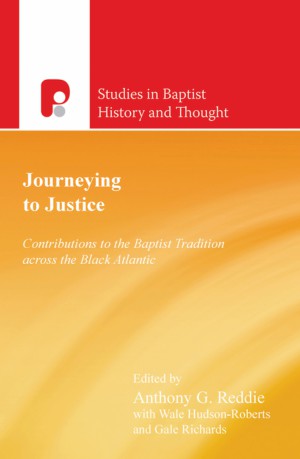'Not all on this journey to justice'
New publication that addresses the past, present and future of British Baptists and their relationships with Black people
 Journeying to Justice – Contribution to the Baptist Tradition across the Black Atlantic
Journeying to Justice – Contribution to the Baptist Tradition across the Black Atlantic
Edited by Anthony G Reddie with Wale Hudson-Roberts and Gale Richards
Authentic
ISBN: 9781842279830
Reviewer: Rosemarie Davidson-Gotobed
There is something a little disconcerting about seeing one’s own name in a book with the word “history” on the cover. Such is life! Journeying to Justice, an edited volume about the progress of racial justice among British Baptists, inspired by the 10th Anniversary of the Baptist Union 2007 Apology for involvement in the Transatlantic Slave Trade, is no lightweight volume in either the quality of its contributors or the issues of justice that they address.
As a mother who is unapologetically ambitious for her children’s education, I was particularly moved by “A call to fulfil the promise of education made by Baptists to the enslaved and their descendants through the 1835 Negro Education Act”. There are few injustices greater than the thwarting of another’s education and development. For this and other broken or half delivered promises, reparations should remain firmly on the table.
By contrast, there were a couple of contributions demonstrating complacency and a weak grasp of critical issues, which begged the question, “Why are you here?” Not being insensitive to the politics, I understand the inclusion, but they demonstrate a failed attempt to dampen the flames that burn brightly on the other pages. Their inclusion serves as a reminder that we as World Majority People will continue to struggle to progress within Baptists Together as long as we are obliged to saddle ourselves with those who just talk the talk without any intention of walking a walk that will empower or enhance us as equals.
Journeying to Justice addresses the past, present and future of British Baptists and their relationships with Black people. It brings into full focus that Black people in Jamaica were the main instigators of their own agency towards liberation and not simply passive recipients of the good will of missionaries like Rowe, Knibb, Phillipo and Burchell. It convincingly challenges the popular notion that much has been achieved in the 10 years since The Apology of 2007, skilfully weaving together narratives to demonstrate, in reality, little has changed in the dynamic of white resistance to black progress over the centuries.
In the present, this volume reflects on the disturbing experience of Baptist Black women in ministry, yet gives practical ways forward. It reflects on the absence of Sam Sharpe in Baptist historiography and its impact on the Caribbean Diaspora in Britain, which is slowly being corrected by the Sam Sharpe Project through its annual lectures.
As for the future, we are encouraged to move beyond the final part of Martin Luther King’s “I Have A Dream” speech to focus on his address to the Tenth Anniversary Convention of the Southern Christian Leadership Conference in 1967 and his paper, “Where Do We Go From Here?”, which, it could be argued, are more significant than the famously overused Washington speech. Importantly, Journeying to Justice also challenges people of colour to decide how they now want to move forward and in doing so, accept that we are still not all on this journey to justice.
Rosemarie Davidson-Gotobed is the National Minority Ethnic Vocations Officer, Archbishop’s Council of the Church of England. She was formerly the first Racial Justice Co-ordinator for the London Baptist Association
Related:
Baptist Times, 31/08/2017